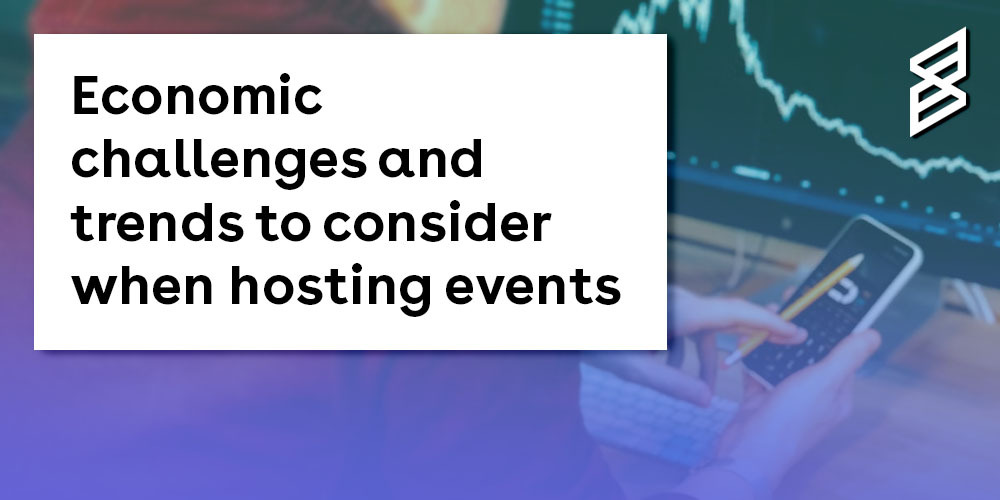- Event Promotion Tips
Economic challenges and trends to consider when hosting events in 2023
-
By Ryan Moss
- 20 Jan 2023
- 8 min read

The cost of living crisis affects everyone. People are struggling to run their households, facing an increase in the cost of food, energy and water, while businesses see economic challenges thanks to the money required to run the moving parts of the ventures they choose to explore.
Uncertainty around how much bills may increase makes rising prices worse. For venues and promoters, this contributes to an inability to plan ahead. The result is a possible decrease in events across the board, which can hurt local communities and performers who rely on a regular flow of bookings to make money, practice their craft and raise their profile.
In this article, we’ve taken a look at some of the effects of the economic challenges brought about by the cost of living crisis, offering ideas on how to keep delivering great experiences to your customers.
Less disposable income
Rising bills, increased energy and growing food costs have felt like a hallmark of 2022. Experts predict this to last into 2023, and the natural effect of paying more for bills is less disposable income.
According to RSM UK – a leading provider of audit, tax, and consulting services to middle-market businesses – Household real disposable incomes aren’t likely to begin rising again until Q3 2023, which is between July and September.

As a result of economic challenges, people may attend fewer events or stop going to events. To give your regular and potential attendees a chance to go to the events they love, you could offer discounted ticket deals as part of your ticket allocation.
This could mean selling bulk tickets, offering different discounts throughout the year or bringing in membership deals to make attending your events cheaper as a whole. Discover how to add discounted tickets, group tickets and more here.
Energy costs for venues
Music venues aren’t immune from the crisis. They’re businesses with running costs and have to pay more alongside everybody else. Inflation means that energy bills increase, with many venue owners saying that they can’t plan or budget because the situation is so unpredictable.
In an article for Huck Magazine, journalist Emma Garland reported that an increase in one venue’s energy quote had turned their “typical £22,000 per year energy bill into £122,000”.
If venues have to pay more for their energy, the increased bills will contribute to them being unable to keep running, and a club night or music event is nothing without its venue.
Events will dwindle if there are fewer venues across the country, meaning less people will experience the fantastic live music this country has to offer.
Economic challenges outside of London
In their ‘Predictions for 2023’ study, leading accountancy firm, PwC has predicted that London and Northern Ireland will be the only two regions in the U.K seeing economic activity above pre-pandemic levels in the coming year.
They say that the shrinkage may happen due to a combination of high inflation and tightening of financial conditions. The pandemic meant that venues had to close for a long time, and some had to close permanently when the restrictions eased.

Combined with the current cost of bills and food, this could mean that venues may struggle with the cost of equipment and customers and potential customers may cut down on the events they attend.
This could mean promoters outside of the capital may face economic challenges when they’re organising events. If this prediction does turn out to be correct, it’ll be a case of adapting to the struggle and trying to deliver maximum value to attendees and potential customers.
Lack of funding
While music venues, live shows and promoters contribute a great deal culturally to the U.K, the entertainment sector is often looked at as a ‘risky sector’. This is said to be down to energy usage, with suppliers quoting venues with higher rates.
Venues were already struggling with high fees, so the energy crisis exacerbates their issue, meaning help has to come from government schemes so venues can survive and continue running events.
If that help doesn’t come, or the plans laid out by the government don’t go far enough, it could lead to them shutting down. For promoters, this will make it harder to organise events because they’ll have to move or find alternative spaces to host their night.
A solution to a potential lack of government support is independent funding. For example, the Music Venue Trust, a U.K. registered charity, are dedicated to supporting grassroots venues across the country.
In 2022, they launched the Pipeline Investment Fund, which provides small-scale grants of £5,000 to music venues. The money supports investments in lights, sound, ventilation, access and minor building alterations. This money can improve a venue’s quality of life, which keeps it running and in a suitable condition to host events.
Similarly, the Arts Council have a funding scheme called ‘Project Grants: Supporting Grassroots Live Music’. It’s available to apply for until the 31st of March 2023 and is ring-fenced, which means it can only be accessed by those who host or promote live music events.
You can apply to the fund and receive between £1,000 and £40,000 for projects up to three years long. The fund requires you, if possible, to be able to find 10% of the total cost of your project from ‘other sources’, which could be merchandise sales, ticket sales or any support from other partners.
Adapt your approach
As a promoter, you might find that your budget is lower in 2023 compared to previous years. So, you may need to adapt your approach to continue organising events. This might mean spending less in certain areas to maximise spending in others.
For example, you’re spending a large chunk on your marketing efforts, with bespoke plans for digital assets and traditional things like flyers, posters and ad space in magazines. Therefore, you could commit to an all digital marketing plan, replacing the paper assets with paid digital ads.

With paid ads, you can control the amount you spend, so experiment with pricing and try to get the most out of your budget. This might mean concentrating your efforts on the social platforms where you’ve historically performed best in the past or using platforms like Facebook, where you can target a large volume of people due to the high user base.
If your event uses paper tickets, consider going fully digital to cut costs on postage. Skiddle’s RapidScan app is free to download, allowing you to save money and provide fast entry for your customers.
Got a question you need an answer to? Give us a call on 03333010301 or ask us a question over on the Skiddle Promoter Twitter account by clicking or tapping on the button below. Alternatively, you can also find a list of our most frequently asked questions over at https://help.promotioncentre.co.uk/
















